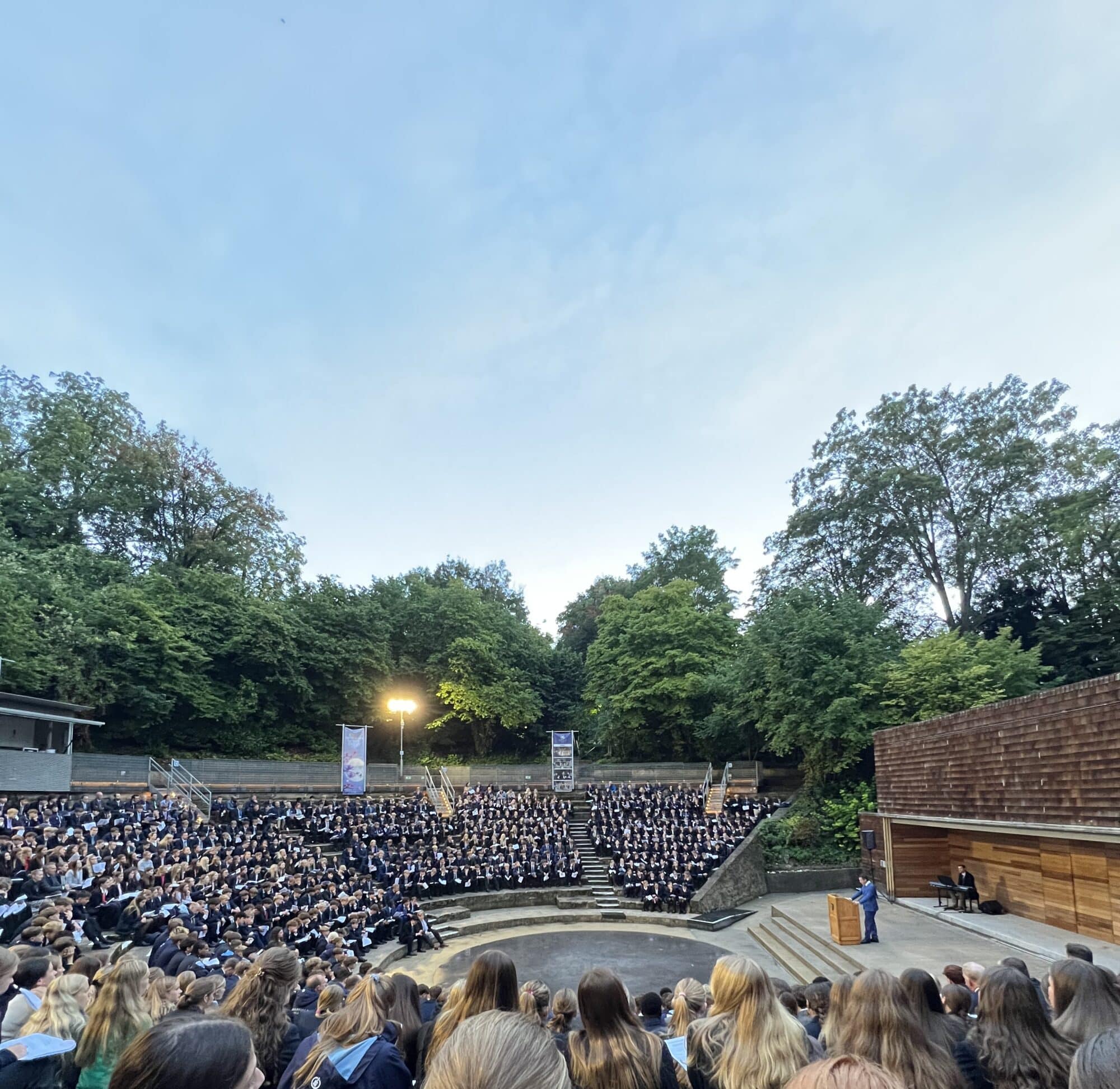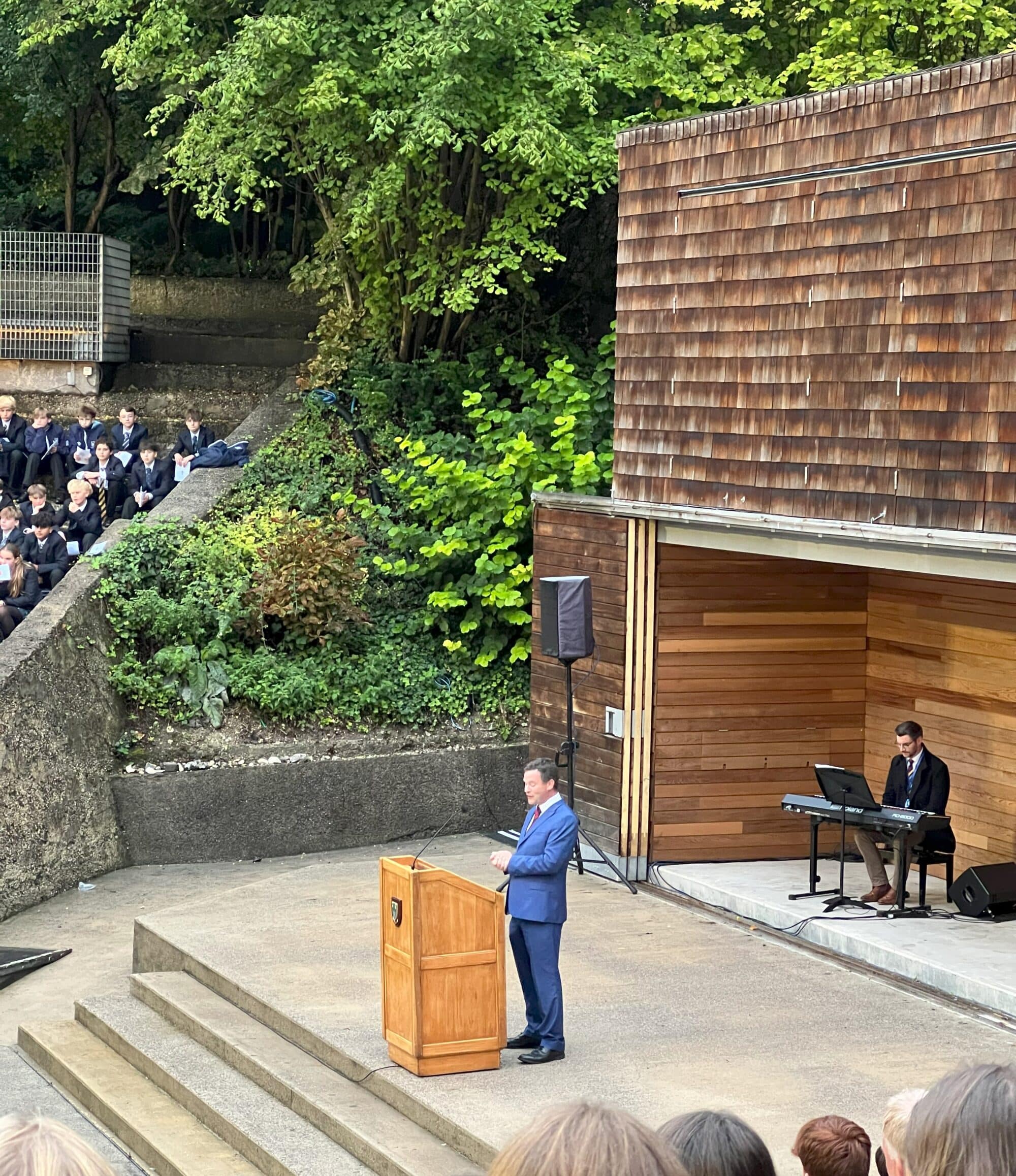
The whole school gathered in Greeker last night to celebrate the start of the school year with the traditional service and handshaking – where every pupil shakes the hand of every member of academic staff. It is a very powerful and visual reminder of the strong sense of community that exists at Bradfield. The reading at the service was the Parable of the Talents, read by Head of School, Emma Salter. Afterwards, Head, Jeremy Quartermain spoke of the parable’s message and his thoughts on the year ahead.
“The Parable of the Talents has a very powerful message insomuch as it challenges us to make full use of the gifts, abilities and opportunities which have been given to us. As we embark upon the forthcoming year, those of you who are new to this community, probably feel a sense of nervous anticipation. Like me, you might be reflecting upon some profound questions. You may well be considering one or more of the following:
‘How do I make the most of my time here at Bradfield?’
‘How do I ensure that I leave Bradfield as a better person?’
‘What is the true purpose of this phase of my life?’
Of course, it is perfectly possible that no such thoughts have entered your head as of yet. You may simply be embracing the joy and delight of catching up with friends after the summer holidays. You may be focusing upon settling into an environment which will feel a little new or different; even if you are returning to Bradfield rather than joining us for the first time. Over the next few minutes, I am going to share with you my personal perspective on The Parable of the Talents.
First and foremost, I believe that our lives should be driven by a strong sense of moral purpose or moral ambition. The Dutch historian, Rutger Bregman’s, concept of moral ambition is quite straightforward. He believes that ‘moral ambition’ is the motivating force which inspires individuals to channel their talents and skills towards making a positive impact in the world’. Having a strong sense of moral purpose and a determination to make a positive contribution to the word we live in surely gives shape and meaning to our lives. The eminent neurologist, psychologist, philosopher and Holocaust survivor, Victor Frankl argued that the meaning of life is found in every moment of living; life never ceases to have meaning, even in suffering and death. From an existential perspective, Frankl believed in our personal ability to transcend our environment and create our own personal sense of meaning. His perspective was formed after experiencing firsthand the very worst of humanity in Theresienstadt, Auschwitz and other concentration camps. Frankl’s philosophy is essentially optimistic and it is empowering insomuch as it emphasises the importance of personal agency.
Of course, we are authors of our own destinies and so it is for us to determine the true purpose and meaning of our lives. We can choose to settle for that which is pedestrian and average or we can commit ourselves to living lives that are full of excitement, beauty and wonder. We can choose to see this wonderful community as a safe, cosy and comfortable haven, or we can see it as an inspiring springboard that will enable us to pursue our dreams.

Situated here in the beauty of the Pang Valley, we have a unique opportunity to contemplate that aspect of our existence which transcends the material Successive Bradfield authors have demonstrated a keen appreciation of the natural world and a very strongly developed sense of ‘place’. One thinks of Richard Adams, author of ‘Watership Down’, Louis de Bernieres, author of ‘Captain Corelli’s Mandolin’, and Robert Winder, whose latest book, ‘The Last Wolf’ tells the history of our island nation through an enchanting evocation of the seasons and the English landscape. Amidst the business of school life, I hope you will find comfort and inspiration in the woods, gardens, fields and open spaces of this beautiful home of ours.
We can reflect upon what this community can provide for us or we can commit to being of very real service to others. We can choose to do enough to get by or we can commit ourselves to developing ourselves intellectually, culturally, emotionally, physically, spiritually and in every aspect of our lives. These are choices that we have to make for ourselves. They are not easy choices, and our sense of purpose will doubtless falter from time to time. Certainly, there will be occasions when we will need to recharge our batteries or rely upon the valued support of our families or teachers. There must be plenty of space in our lives for friendship, fun and laughter and I do hope that you will feel fulfilment and happiness from living a full and active life. I hope you will derive enormous pleasure from both the enduring friendships that you will make here and the experiences and opportunities that are available to you here.
Being a member of this extraordinary community is a privilege, but it comes with obvious responsibilities. We live in a world that is increasingly meritocratic, and it is quite right that you will need to prove yourselves in a context where many of your contemporaries will have overcome significant economic and social challenges to get on in life. Of course, many of you have faced significant adversity in your lives and those who seek to pigeonhole or denigrate young people on account of the school that they have attended are wrong to do so. However, it is right that people should expect us, individually and collectively, to make a positive contribution to society.
Still, as the Parable of the Talents suggests, it is important for us to make the very most of our talents – not just for the benefit of ourselves but for the service of others. To be ambitious in all areas of our lives means that we are more likely to accomplish great things. To simply ‘settle’ is to waste the opportunities and privileges that we have been gifted. It is akin to the lottery winner who squanders their millions on endless luxury goods, exotic holidays and other personal indulgences. The wise lottery winner invests their money in worthwhile projects that have the potential to bring an enriching legacy of joy, delight and sustenance to others.
Sometimes, our anxieties prevent us from being brave and taking the very risks which will allow us to soar like eagles in the skies above. Personally, I feel a good deal of compassion for the third servant in the Parable of the Talents. He buries his money because he possesses a cautious disposition. He is not intrinsically bad, and it is not his fault that he is worried about angering his master. Perhaps his master was not the easiest of men. If we want those around us to thrive then they will more likely do so if they are provided with support and encouragement.
As we head into this new academic year, let us do so with full and grateful hearts. Let us commit to treating those around us with love, kindness and respect and let us greet one another with a friendly smile. I do hope that you will feel the warm embrace of this community and that those joining us anew will feel welcomed and valued. I hope that you will rapidly feel a sense of belonging that will flow from a thousand acts of kindness and love.
Finally, let me leave you with a compelling image of the transitory nature of things provided by the first historian of the English people, the Venerable Bede. Considered by many to be the most important scholar of the eighth century, Bede lived out his life in the monastic community of Jarrow which was situated in the Kingdom of Northumbria. His Ecclesiastical History of the English People overflows with wisdom, humanity and anecdotes. Bede once told a great king that,
“The present life of man upon earth, O King, seems to me in comparison with that time which is unknown to us like the swift flight of a sparrow through the mead-hall where you sit at supper in winter, with your Ealdormen and thanes, while the fire blazes in the midst and the hall is warmed, but the wintry storms of rain or snow are raging abroad. The sparrow, flying in at one door and immediately out at another, whilst he is within, is safe from the wintry tempest, but after a short space of fair weather, he immediately vanishes out of your sight, passing from winter to winter again. So this life of man appears for a little while, but of what is to follow or what went before we know nothing at all.”
The transitory nature of life when measured against the passing of time is not something for us to fear. Bede’s parable of the sparrow is not a lament for the fleeting brevity of human existence. Instead, it is a call to live with hope and purpose. It is a call to live a meaningful life.
As we embark upon this exciting journey together, I wish you every blessing for the year ahead. May you feel the loving embrace of this most special community. Whether or not you have a faith, I hope that the spiritual dimension of your life will be enriched by the opportunities that this place provides for quietness and contemplation. Equally, I hope that your lives will be enriched by the presence of others and the opportunity to invest in the fabulous richness of school life.”


